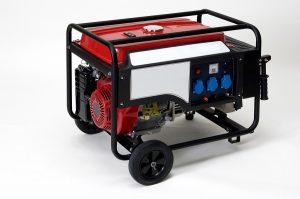Storms or natural disasters can create power outages that last for an extended period of time. During an outage, portable generators can offer much-needed temporary power, but there are potential risks associated with the use of these generators. Generators can be dangerous, and can lead to illness and injury, and even death if used improperly.
When using a portable generator, it is important to take safety precautions. Follow these guidelines for safe generator use:
- Read the manufacturer’s operating manual and safety instructions before using your generator.
- Never leave your generator running unattended, while you are away from your home or business.
- Check your generator regularly while it is in operation.
- Use caution when touching your generator as many areas become hot and cause burns.
Electrical Hazards
Electricity supplied by a generator has the same hazards as your regular utility-supplied electricity. You can face additional risks if your generator is not installed or operated properly, particularly if safety devices such as circuit breakers are not properly operating. It is recommended that you contact the manufacturer regarding proper installation, or even hire an electrical contractor to properly install it for you.
- Be sure your hands are dry and that you are not standing in water before touching the generator.
- Never plug your generator into a wall outlet.
- Follow the manufacturer’s instructions for properly grounding your generator to help avoid electrical shock.
- Plug appliances directly into the generator using manufacturer-specified cords or three-pronged extension cords with the proper amperage rating for the intended use.
- Be aware that portable generators become hot while running and remain hot for a significant amount of time after they are shut down, creating a potential fire or burn hazard.
Never Operate a Generator Indoors
Generators should never be operated indoors under any circumstances. This includes never operating a generator in a garage or basement, or near windows, vents or doors. Your generator should be kept a safe distance from the exterior of your home or business. A minimum distance of 25 feet is recommended; however, you should check your local city or county ordinances and the manufacturer’s recommended practices for additional information. Be sure to take your neighbor’s or neighboring businesses’ windows, vents and doors into account when positioning your generator. The exhaust from a generator can build up carbon monoxide (CO) – a colorless, odorless, toxic gas – that can cause severe illness or even death.
- Maintain a clear space of three to four feet on all sides and above the generator to allow for proper ventilation.
- Install carbon monoxide (CO) alarms to help safeguard your home or business. These alarms come in various forms–battery-operated, plug-in, or even hard-wired units. Plug-in and hard-wired units typically have battery backups. Be sure to routinely test the alarms, and replace batteries as recommended by the manufacturer.
Refueling Your Generator
You should always use caution when refueling your portable generator to prevent skin burns or fires. Follow these safety tips to ensure you properly refuel your generator:
- Do not try to refuel a generator while it is running.
- Make sure all generator fuels are stored and transported in approved containers.
- Fuels should not be stored in or near your
- house or business. They should be stored in a separate, well-ventilated area or in an approved flammable liquids storage cabinet.
- Shut down your generator and allow it to cool completely before refueling. Gasoline, kerosene or other fuels used to run generators can ignite if spilled on hot engine parts.
- Do not smoke around fuel containers or while refueling your generator.

